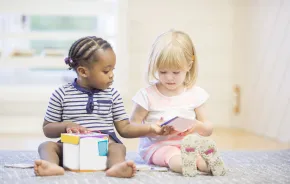My 7-year-old son is a gentle, good-natured little guy who rarely gets into trouble. So I will admit to being shocked when I recently caught my freckled-faced kid in a bald-faced lie.

The conversation took place when, after leaving the kitchen for a few minutes, I returned to find him putting his curiously empty dinner plate on the counter. It went something like this:
“So, Alex, did you really finish everything?”
“Yes.”
“You didn’t feed your dinner to the dog?”
“No.”
“You didn’t throw it in the garbage?”
“No, Mom.”
“You really finished everything?”
“Yes, I said!”
“OK, great job! Head upstairs and we’ll get you ready for bed.”
A quick peek in the garbage can revealed a lump of lasagna and carrots. The evidence was damning, and I was disappointed.
The reality is that, like adults, children lie for all kinds of reasons. They do not want what is served for dinner, or maybe they threw a baseball through the neighbor’s window. Perhaps they watched a movie at a friend’s slumber party that they are not allowed to watch at home.
Experts say lying should not be taken lightly. Chronic lying can result in permanent damage to a child’s self-esteem. In older children, compulsive lying is sometimes associated with depression.
Whatever you do, do not call your child a “liar,” says Dr. David Callies, a child psychologist in Olympia. Instead, parents should approach the lie as a mistake rather than a character flaw. Children live up — or down — to their labels.
Fundamentally, Callies says, children choose not to tell the truth because they think they are solving a problem; in fact, he calls lying “maladaptive problem solving.” So if parents can figure out the root problem behind the lies, it is a first step toward breaking the cycle and habit of lying.
Once most children reach the age of 6 or 7, they no longer confuse fantasy with reality. If a parent finds that a child between 6 and 10 has lied, Callies says it is particularly important for parents to control their anger. “If a parent flies off the handle, communication stops.”
For children younger than 10 years old, calmly explain to them that the act of lying is worse than the mistake that prompted the lie, no matter how bad that is. As Callies stresses, these are the times when parents can gain the trust of children in this crucial age group, when the mistakes made are usually not life threatening. Give these children a chance to fix the problem and to apologize if the situation warrants that.
For slightly older children, between 11 and 14 years old, consequences become even more important. These kids usually have more freedom, independence and responsibility. If they lied about their whereabouts, saying they were at Friend X’s house rather than Friend Y’s house after school, the child has broken the parent’s trust. After all, with technologies like cell phones, instant messaging and coded beepers, it’s easier than ever for young people to be somewhere they are not supposed to be and downright secretive about their associations.
The parent must explain their disappointment and also come up with an appropriate consequence. Callies suggests you say something like “I’m not sure if you are lying in other areas, too, so maybe I need to pick you up after school because you are not ready for that freedom yet.”
By the age of 9, a child has likely figured out that if he or she says their homework is done, they will get to go outside and play, instead of staying inside the boring old house doing math problems. Again, parents need to think about consequences. Don’t scream, yell and lecture. Rather, express your disappointment and take away a privilege. For some families, it might be taking away TV or screen time; for other families, the child might lose the opportunity to do homework on their own and for the next two weeks, they will have mom or dad looking over their shoulder.
Self-esteem issues
Often, children will lie to make themselves appear better at something than they are. They will tell their friends that they hit a triple in their softball game, or that they scored seven soccer goals. They want to be liked, admired or even just accepted.
A child might lie out of fear or a sense of self-preservation. These are not lies to take lightly. A child worries that a parent will be mad because they ran too slowly or didn’t win the spelling bee, so they lie to either change the result or make up an excuse for what happened. Perhaps they feel that they just cannot disappoint their parents one more time.
In these situations, Callies says a parent must do all they can to instill self-confidence in their child. Spend time with the child. Tell them you love them, whether they win or lose.
If the child feels pressure to live up to dad’s glorious baseball legacy, tell them that they are wonderful in their own right. When self-esteem issues are at the heart of lying, experts say parents may need to look in the mirror and ask themselves what pressure they are putting on their children.
This is not to say that competition and stress excuse lying or cheating. In fact, if the sport or game is taught correctly, it should discourage that behavior. Leo Stefurak, a chess master and longtime coach of Seattle-area chess students, believes that children have a “powerful sense of fairness, what is right and wrong.”
Stefurak says when children learn the mental discipline of being honest, they are learning a life lesson without even knowing it. “Children may not understand why lying in the broader world is a big thing,” says Stefurak, “but they can understand within the constraints of the chess game why lying messes up their opponent — and the whole game.”
As with other behavioral issues, being a good role model is critical. So think twice before faking a cough and calling in sick to work!
Hilary Benson is a Seattle-area freelance writer and mother of three children.











